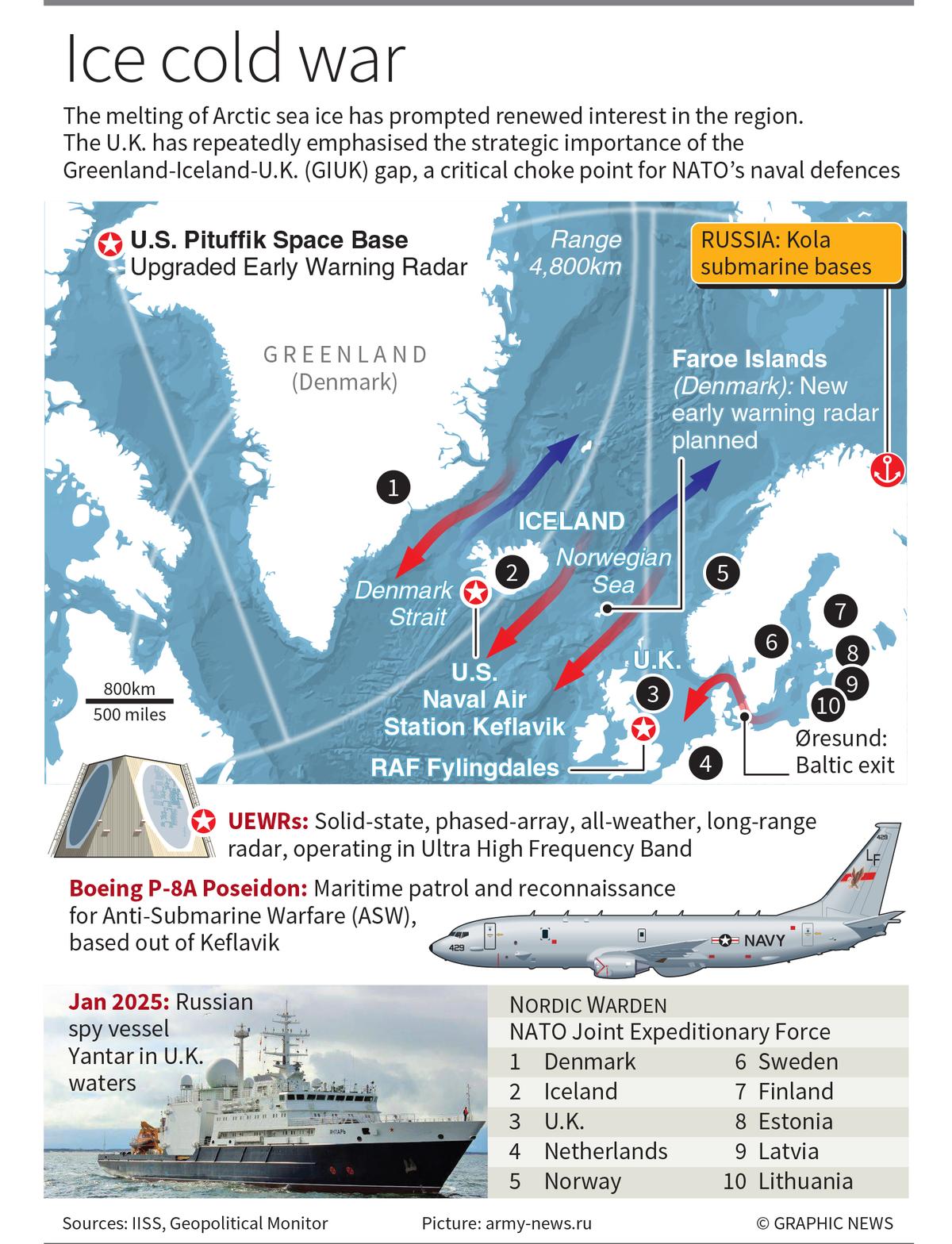Arctic Geopolitics

- 02 Apr 2025
In News:
The Arctic region, traditionally isolated due to its extreme climate and thick ice cover, is rapidly emerging as a global geopolitical hotspot. Accelerated melting of ice caps due to climate change has unlocked access to untapped resources and new shipping routes, intensifying competition among major powers.
Resource Wealth and Strategic Significance
- The Arctic holds an estimated 13% of the world’s undiscovered oil and 30% of untapped natural gas (USGS, 2009).
- Rich in rare earth elements, phosphates, and copper, particularly in areas like Greenland.
- Melting ice is opening access to valuable fishing grounds and enabling commercial navigation.
Emerging Shipping Routes
- Northeast Passage (Northern Sea Route): Along Russia’s Arctic coast, connecting Europe and Asia. Reduces distance by ~8,000 km compared to the Suez Canal.
- Northwest Passage: Through Canada’s Arctic Archipelago. Disputed between Canada (claims internal waters) and the U.S. (asserts international strait).
These routes offer significant economic and strategic advantages, including reduced dependency on traditional chokepoints like the Suez Canal.
Governance: The Arctic Council
The Arctic Council, established by the 1996 Ottawa Declaration, is the key intergovernmental forum for Arctic affairs.
Members (8 Arctic States):
- Canada, Denmark (via Greenland), Finland, Iceland, Norway, Russia, Sweden, and the United States
These countries:
- Control Arctic land territories
- Have sovereign rights over resources within their Exclusive Economic Zones (EEZs)
Permanent Participants:
- Six Indigenous groups representing Arctic communities.
Observers:
- Includes India, China, Japan, UK, among others.
- 13 countries, 13 intergovernmental, and 12 non-governmental organisations.
- All decisions require consensus of member states and consultation with Indigenous groups.
Legal Framework and Territorial Claims
- Governed primarily by UNCLOS (United Nations Convention on the Law of the Sea).
- Allows Arctic states to extend claims beyond their 200-nautical-mile EEZ if they prove natural extension of the continental shelf.
- Russia, Canada, and Denmark have submitted overlapping claims to the Arctic seabed.
Unlike Antarctica, which is demilitarised under international treaties, the Arctic has no such binding legal framework, allowing military infrastructure and territorial claims.
Geopolitical Tensions in the Arctic
Russia’s Military Build-up:
- Largest fleet of Arctic icebreakers, including nuclear-powered vessels.
- Maintains Soviet-era Arctic military bases.
- Planted a flag on the Arctic seabed at the North Pole in 2007.
- In 2022, conducted naval exercises with China, signaling deepening strategic ties.
U.S. Interests:
- Renewed interest in Greenland, citing national security.
- Operates the Pituffik Air Base in Greenland.
- Dispute with Canada over Northwest Passage navigation rights.
NATO’s Arctic Response:
- All Arctic Council members except Russia are NATO allies.
- NATO has increased its Arctic presence post-Ukraine conflict.
- Strategic focus on GIUK (Greenland-Iceland-UK) Gap, a critical naval chokepoint for Russian submarines.
China’s Arctic Aspirations:
- Declared itself a "Near-Arctic State" in 2018.
- Investing in Arctic research and building its first nuclear-powered icebreaker.
- Interested in Russia’s Northeast Passage for trade under the proposed “Polar Silk Road”.
India and the Arctic
India, an observer in the Arctic Council, is closely monitoring developments. It has an Arctic Policy focusing on:
- Scientific research
- Climate and environmental protection
- International cooperation
